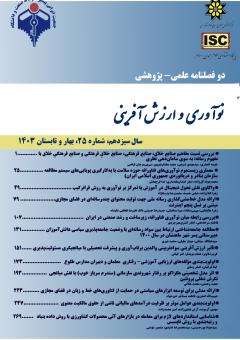تحلیل تاثیر نوآوری و نقش میانجی فرهنگ سازمانی بر استراتژی سازمان ( مورد مطالعه: سازمان بنادر و دریانوردی جمهوری اسلامی ایران)
محورهای موضوعی : New scientific findings in the fields of innovation and entrepreneurship
محمد جواد گل زاده
1
![]() ,
صابر خندان علمداری
2
,
صابر خندان علمداری
2
![]() ,
ندا فرح بخش
3
,
ندا فرح بخش
3
![]()
1 - دانش آموخته ی مقطع دکتری تخصصی، گروه مدیریت تکنولوژی - مدیریت نوآوری، واحد رودهن، دانشگاه آزاد اسلامی، رودهن، ایران
2 - استادیار و عضو هیات علمی، گروه مدیریت صنعتی، واحد رودهن، دانشگاه آزاد اسلامی، رودهن، ایران
3 - استادیار و عضو هیات علمی، گروه علوم اقتصادی، واحد رودهن، دانشگاه آزاد اسلامی ، رودهن ، ایران
کلید واژه: موفقیت استراتژی سازمان, فرهنگ سازمانی, نوآوری سازمانی, سازمان بنادر و دریانوردی,
چکیده مقاله :
پژوهش حاضر با هدف ، تحلیل تاثیر نوآوری و نقش میانجی فرهنگ سازمانی بر استراتژی سازمان و همچنین تعیین روابط بین این عوامل می باشد که از نظر هدف کاربردی و روش آن توصیفی و از نوع همبستگی علّی می باشد. نمونه آماری این تحقیق 266 نفر از کارکنان و کارمندان بخش ستادی سازمان بنادر و دریانوردی جمهوری اسلامی ایران بوده است که با استفاده از روش نمونه گیری تصادفی ساده انتخاب شدند. پایایی پرسشنامه توسط آلفای کرونباخ برای پرسشنامه (95/0) تعیین گردید. تجزیه و تحلیل داده ها از طریق آمار توصیفی و آمار استنباطی انجام شد. مدل معادلات ساختاری (SEM) با استفاده از نرم افزار ایموس برای بررسی روابط میان سازههای این تحقیق به کار گرفته شد. هدف آرمانی این پژوهش: ارائه راهکارهای مناسب برای راهنمایی مدیران و
برنامه ریزان و طراحان سازمان ها، جهت انتخاب متناسب فرهنگ سازمانی که به وسیله آن، فضای مناسبی جهت بروز استعدادها و خلاقیت افراد در سازمان فراهم آید و در نهایت منجر به تدوین استراتژی های مناسب برای رسیدن به اهداف سازمان گردد. یافتههای تحقیق بیان میدارند : 1. فرهنگ سازمانی بر نوآوری سازمانی تأثیرمستقیمی دارد. 2. نوآوری سازمانی و فرهنگ سازمانی تأثیر مستقیمی بر موفقیت استراتژی سازمان دارد. 3. فرهنگ سازمانی بر موفقیت استراتژی سازمان تاثیرگذار است. 4. ظرفیتهای سختافزاری و نرمافزاری بر سرمایه دانش ، سرمایه تخصص و سرمایه مهارت تاثیر دارند. 5 . سرمایههای مذکور نیز بر دیدهبانی اثر گذاشته و به نوآوری خدمات و نوآوری فرایندی منجر میشوند. 6 . مولفههای مذکور به نوآوری سازمانی منجر شده و نوآوری سازمانی نیز بر عملکرد وظیفهای ، عملکرد انسانی ، عملکرد نوآورانه و عملکرد کیفی تاثیر میگذارد . 7 . در نهایت مولفههای مذکور به ارتقای عملکرد سازمانی منجر میشوند
The purpose of this research is to analyze the impact of innovation and the mediating role of organizational culture on the organization's strategy, as well as to determine the relationships between these factors, which is descriptive in terms of its practical purpose and method, and of the causal correlation type. The statistical sample of this research was 266 employees and employees of the headquarters department of the Ports and Maritime Organization of the Islamic Republic of Iran, who were selected using a simple random sampling method. The reliability of the questionnaire was determined by Cronbach's alpha (0.95). Data analysis was done through descriptive statistics and inferential statistics. The Structural Equation Model (SEM) was used to examine the relationships between the constructs of this research using Emus software. The ideal goal of this research is to provide suitable solutions to guide managers and planners and designers of organizations, in order to choose the appropriate organizational culture that will provide a suitable environment for the development of talents and creativity of people in the organization. and finally lead to formulating appropriate strategies to achieve the goals of the organization. The findings of the research state: 1 . Organizational culture has a direct effect on organizational innovation. 2. Organizational innovation and organizational culture have a direct impact on the success of the organization's strategy. 3 . Organizational culture affects the success of the organization's strategy. 4 . Hardware and software capacities have an effect on knowledge capital, expertise capital and skill capital. 5 . The aforementioned funds also affect surveillance and lead to service innovation and process innovation. 6. The mentioned components lead to organizational innovation and organizational innovation also affects task performance, human performance, innovative performance and quality performance. 7. Finally, the mentioned components lead to the improvement of organizational performance
